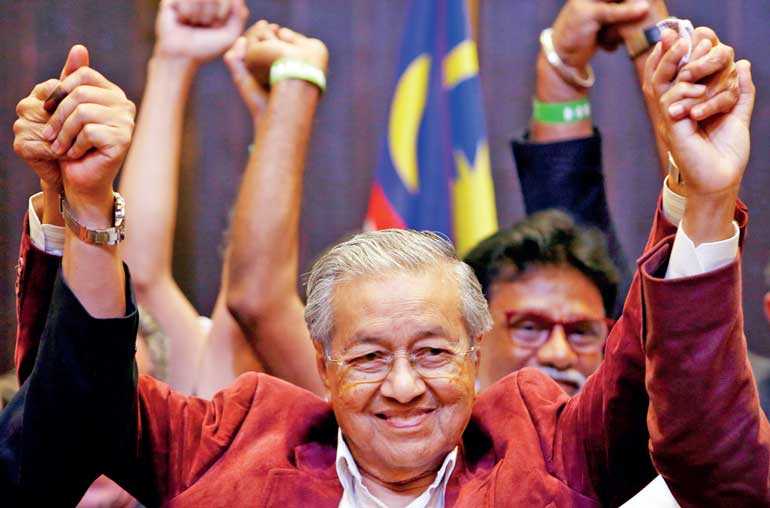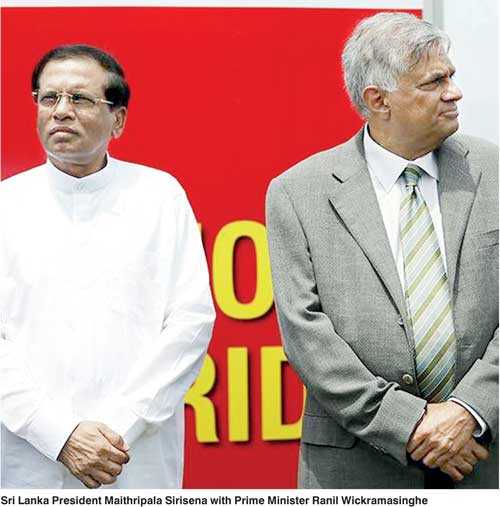Tuesday Feb 24, 2026
Tuesday Feb 24, 2026
Monday, 4 June 2018 00:10 - - {{hitsCtrl.values.hits}}

Dr Mahathir Mohamad
Man who was engaged in a Dharma Yuddha
The election of 92-year-old Dr Mahathir Mohamad, commonly known as Mahathir, to premiership by Malaysian voters, especially the young voters, has been a surprise to many. That was not only because of his age, but because of the challenge he successfully posed to the powerful 60-year rule of the incumbent Malaysian administration. He has been viewed as the destroyer of the party which he had led for 22 long years.
Had Austrian-American economist Joseph Schumpeter been alive today, he would have termed it a ‘creative destruction’. As Mahathir had pronounced on many occasions during the election campaign, his re-entry to politics had been prompted by the need for rescuing Malaysia from the unjust rule of those who had inherited the party’s mantle upon his retirement from politics in 2003. The author of Mahabharata, Vyasa, would have called it a ‘Dharma Yuddha’ or a war for restoring righteousness.
Mahathir, the trouble-shooter
Mahathir has been a trouble-shooter whenever Malaysia had been in trouble in the past. At the time he became Prime Minister in 1981, Malaysia’s average per capita income (PCI) amounted to $1900, compared to its resource-poor neighbour to the south, Singapore, which had recorded a PCI of $5600. A little more than a half of the population was in abject poverty. It was living basically by exporting primary agricultural products to the rest of the world.
Unlike its former companion, Singapore, which had set itself on a high growth path, Malaysia’s growth rate was falling from a high 9% in 1975 to 6% in 1982. Since then, for a few years, it had its ups and downs around that rate, but after 1984, there was a sharp nose-dive in which growth rate fell to a negative 1% in 1985. That was a real economic crisis which required quick fixing and Mahathir was up to that challenge.

Infuse private brain power to state enterprises
According to Sri Lankan- born economist at Australian National University, Prof Prema-Chandra Athukorala, the crisis was due to Malaysia’s inability to face the high interest rates in the USA in early 1980s, reinforced by a collapse of commodity prices, at a time when it had gone for a rapid expansion in government expenditure, known as fiscal activism, under a New Economic Policy introduced in 1971 (see https://crawford.anu.edu.au/acde/publications/publish/papers/wp2010/wp_econ_2010_12.pdf).
Mahathir did not want to seek support from the IMF, but he had introduced the very same IMF prescription on his own. The policy package introduced by Mahathir consisted of a painful cut in government expenditure, devaluation of the ringgit, and accepting the private sector as the engine of growth. This was a significant departure from the policy it had followed in the previous decade.
In line with relying on private sector for economic growth, private sector brain-power was infused to state enterprises, replacing the bureaucrats who had built semi-empires within them, while foreign direct investments in new export industries were brought in.
The devaluation of the ringgit was so high that it caused the real effective exchange rate to depreciate massively, by about 40% during 1986 to 1990. The result was the gradual recovery of the economy from negative 1% in 1985 to positive 1% in 1986 and about 10% by 1988. Thereafter, it remained at that high level, till 1996 just before the onset of the East Asian Financial Crisis in 1997.
Speculative money coming into a country is the worst enemy
Given the high growth at about 10% per annum, low inflation, near-full employment and low external debt, nobody would have predicted that Malaysia would be hit by a financial crisis in 1997. The general belief was that when Thailand was hit by the crisis, Malaysia too got hit by a common infection it would have got from Thailand, known as ‘contagion effect’.
But Athukorala says that there were signs of vulnerability of Malaysia’s external sector, due to a high inflow of speculative foreign funds to its financial market by way of portfolio investments. These investments, which are of very short term, are the ones which would fly out of a country in the event of the first suspicion about a country’s ability to meet its foreign obligations. Such outflows would be fatal to an economy, if its private sector is infected by bad governance and its financial sector has been fragile. Both these weak points contributed to the extension of the Thai financial crisis to Malaysia as well.

Implementing IMF policy without getting the IMF in
Thus, overnight, all the pleasant feelings about the strength of Malaysian economy totally evaporated. The economic growth, which had fallen from the previous high to 7% in 1997 declined sharply to negative 7% by 1998. With that, Malaysia officially went into recession.
Then, it was a massive operation to rescue the economy, and it fell on Mahathir’s shoulders. Once again, Mahathir did not seek IMF support, but introduced more or less the same IMF policy prescription on his own. Athukorala says that had Malaysia wanted, it could have surely gone for IMF support, because by that time the IMF too had somewhat relaxed its policy approach to a crisis of this nature. But seeking IMF support was not politically acceptable to Mahathir, because as he had announced to party members at a party conference, getting IMF support meant opening the economy to foreign investors, and getting foreign investors at that time meant betraying Bumiputras, the Sons of Soil who had been favoured by the government officially by extending special concessions to them. Therefore, he went for a home-grown policy package which had important ingredients from IMF policy.
A painful cut down of demand by depreciating the ringgit
The policy required Malaysia to cut down its demand and for that purpose, both price and quantity controls were used. In the case of control by price, the exchange rate was depreciated by a massive amount from Ringgit 2.50 a dollar in the middle of 1997 to Ringgit 4.72 a dollar by January 1998. That was a depreciation of nearly 90%. The quantity controls were introduced by invoking exchange controls over capital transfers. Thus, Malaysians – public, businesses and the government – had to do business at prices as well as quantities fixed by the government. But it did the trick. The massive depreciation curtailed imports and encouraged exports, leading to a surplus in the trade account. Malaysia has been able to maintain this surplus throughout the period till today. Since there was no flying out of capital, the inflow of foreign exchange caused the ringgit to appreciate over the years and by May 1999, rate appreciated to Ringgit 3.80 per dollar. Malaysia was able to stick to this fixed exchange rate till July 2005 by buying dollars from the market and supplying ringgit funds.
When it started to cause money supply to rise and inflation to creep in, it had to abandon the fixed exchange rate policy and allow ringgit to appreciate in the market. Since then, the exchange rate has been hovering between 3.70 and 3.98 Ringgit to a dollar. This policy package kept the budget deficit, on average, at around 4% of GDP; thus, public debt which was as high as 40% of GDP in 1995 was reduced to 30% of GDP by end 1998. Since then, the debt level was maintained between 40% and 55% of GDP. In 2017, it was around 50% of GDP.
These are all the usual IMF prescriptions to a country. What Mahathir has shown is that if a country is wise enough to adopt a prudent policy package in the midst of a crisis, there is no need to invite the IMF to come and support it. The IMF is needed for a country like Sri Lanka, because its leaders do not think it prudent to adopt such a policy package on their own. By the time Mahathir retired from politics, Malaysia’s economy had fully recovered from the 1997/98 economic crisis and was back on its historical economic growth path.
Advice to Sri Lankan leaders: ‘Treat the defeated well and world opinion will turn to your side’
Mahathir visited Sri Lanka in 2010 to address the Sri Lanka-Malaysia Business Council. At this address, as well as in a subsequent interview with Daily Mirror online, he left Sri Lankan leaders with an invaluable piece of wisdom (access DM interview here: https://www.youtube.com/watch?v=CNpeHrgudwQ).
In answering the questions by the local journalist, who appeared to be working hard to get a certain expected opinion from him, he showed his statesmanship without taking a side. For instance, when his opinion was asked about the criticism by Western countries that Sri Lanka had committed excesses during the 30-year-old war, he gave an answer with a lot of foresight. He said that it is inevitable that people should die in a war. Hence, it is more important to settle disputes without resorting to wars. But now the war has taken place, what Sri Lanka should do is to treat the defeated well. If they are integrated to society and if they also benefit from the development initiative taking place, he assured that the world opinion would certainly change in favour of Sri Lanka.
What he stressed was that the ball was in the court of Sri Lankan leaders, and it was up to them to pick up the ball and play the game to suit the international conditions. If they managed their house properly, there was no role for foreigners to intervene in the country’s affairs.
Even today, this piece of wisdom has been ignored by Sri Lanka’s leaders. Instead of delivering their obligations toward the defeated, they have declared war against the Western nations. The best answer to the criticism by anyone, according to him, was to be open, not to hide anything and explain everything that you have done has been within the law and not outside the law.
Knowledge is the key to development
At the address before the Sri Lanka-Malaysia Business Council, Mahathir said that Malaysia was able to attain growth and prosperity by having peace with its three ethnic communities (available at: http://www.sundaytimes.lk/100613/BusinessTimes/bt22.html).
If a country allowed issues to slide, it would have to face bigger problems later. Hence, it is advisable to sort them out at the first instance. Different ethnic communities have different religions, cultural practices and languages. Recognising this diversity, early Malaysian leaders had accommodated all the three ethnic groups in the government. They were therefore able to share the common wealth of the country.
Since knowledge is the key to development, Malaysia took action to develop knowledge delivering institutions. Initially, Malaysia had only a few state universities, which were not adequate to meet the aspirations of its people. Hence, they were forced to go abroad to gain knowledge. Now, Malaysia has 30 state universities and an equal number of private universities. That was how Malaysia became an educational hub in the region. By 2010, there were more than 100,000 foreign students studying in Malaysia. By 2017, this has swelled to more than 137,000 and is on the increase. Education can be an important foreign exchange earner for any country. It is up to the leaders to exploit that gold mine for the benefit of the people of the country.
Conflicts and confrontations with other nations are the worst enemies
It is this Mahathir Mohamad, aged 92, who has become the Prime Minister of Malaysia today. His economic vision is extremely nationalistic. However, he follows a code that is fully compatible with basic laws of economics. He is for trade and investment. But he is against the exploitation of one nation by another in the name of trade and investment.
These are also sound economic principles because when one nation is exploited by another, there is no equal exchange, and as a result it always leads to conflicts and confrontations. Conflicts and confrontations are the worst enemies of sustained economic prosperity. The role of the government is to remove every seed of conflicts and confrontations and allow the economies to function well. All the nations today are organised as nations. All nations are competing with other nations for gaining a better deal from their transactions. This competition drives them not to the annihilation of others. It drives them to seek after a solution in which all will be able to reap benefits of global growth. In this sense, Mahathir has an unfinished job to do in Malaysia.
Mahathir is a leader who delivers what he promises. Perhaps, this is the best lesson which Sri Lankan leaders can learn from him.
W A Wijewardena, a former Deputy Governor of the Central Bank of Sri Lanka, can be reached at [email protected]